Solomon and Contradictions - Lesson 2
Mike Ervin
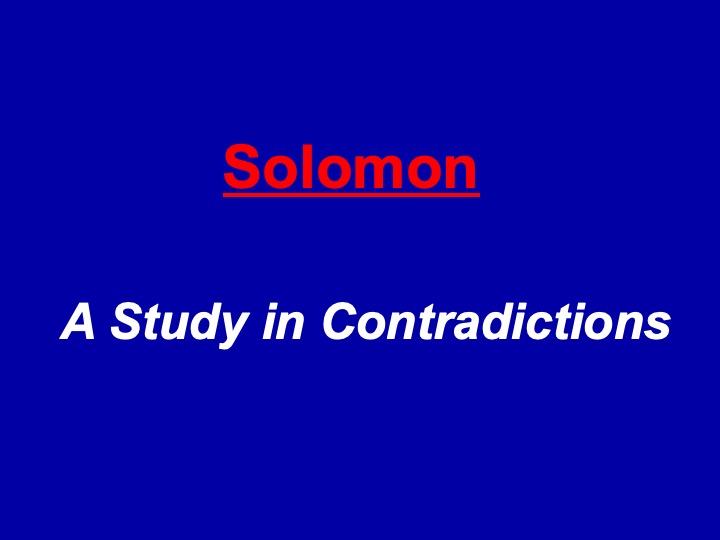
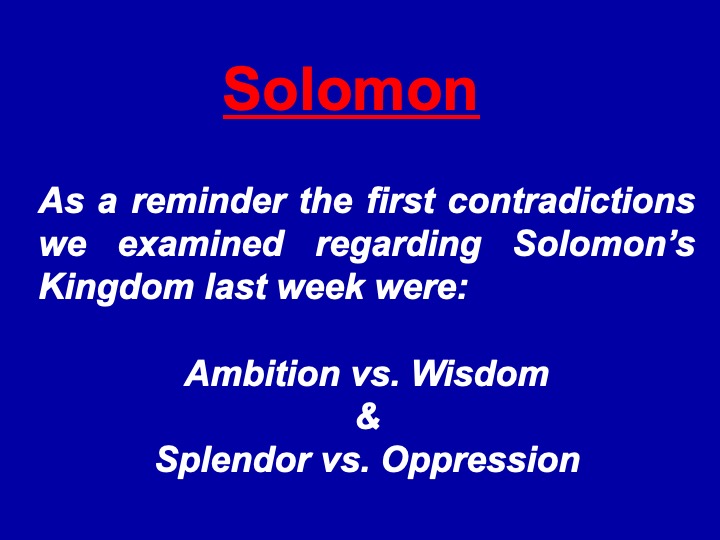
Solomon and Contradictions
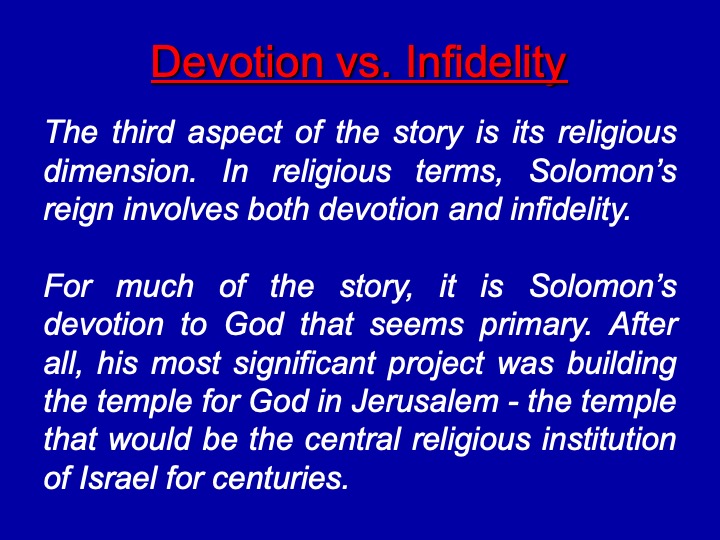
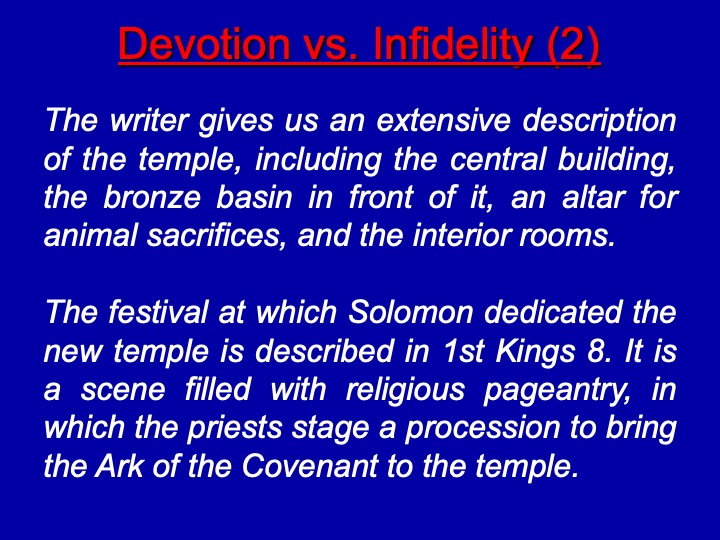
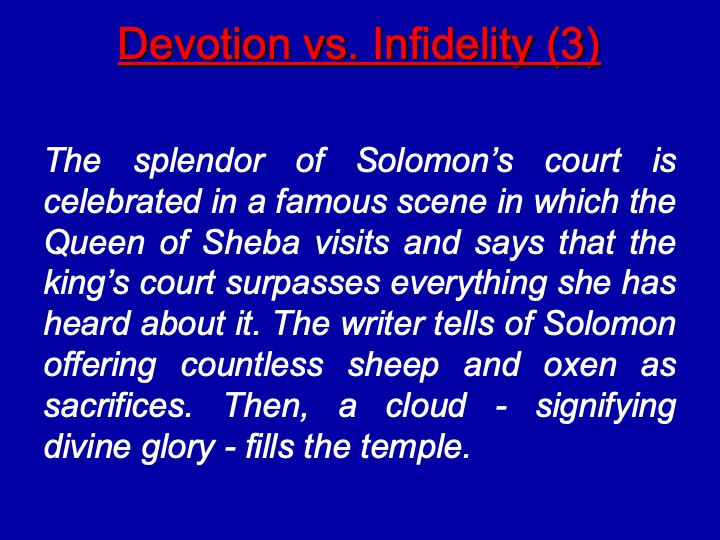
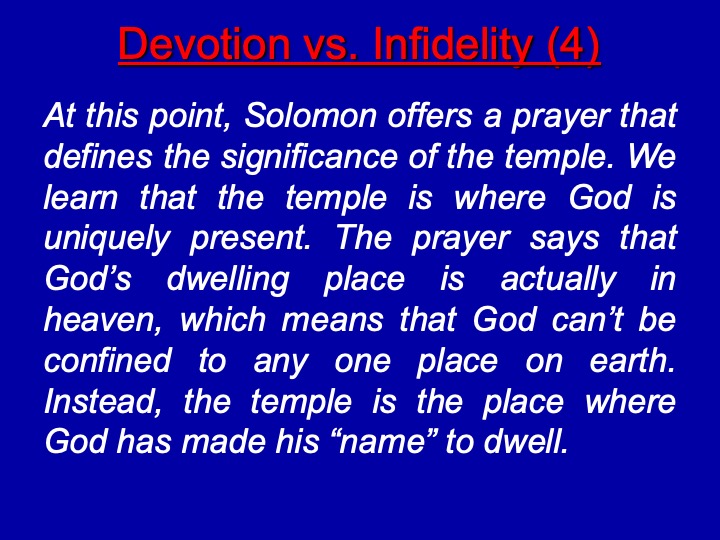
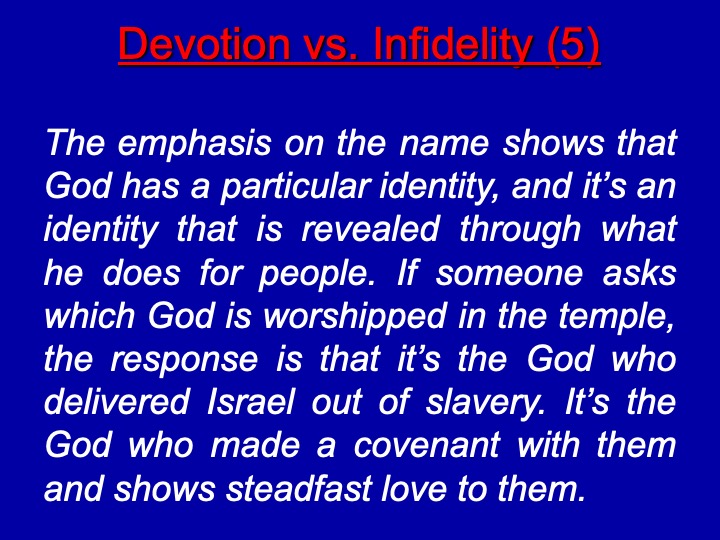
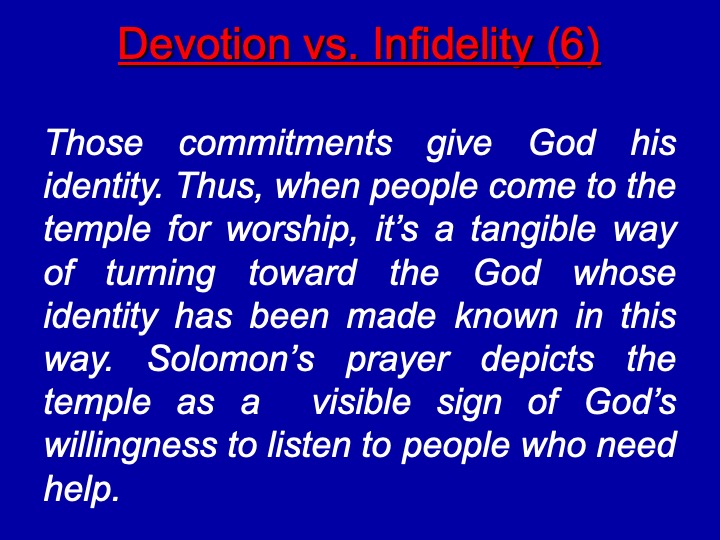
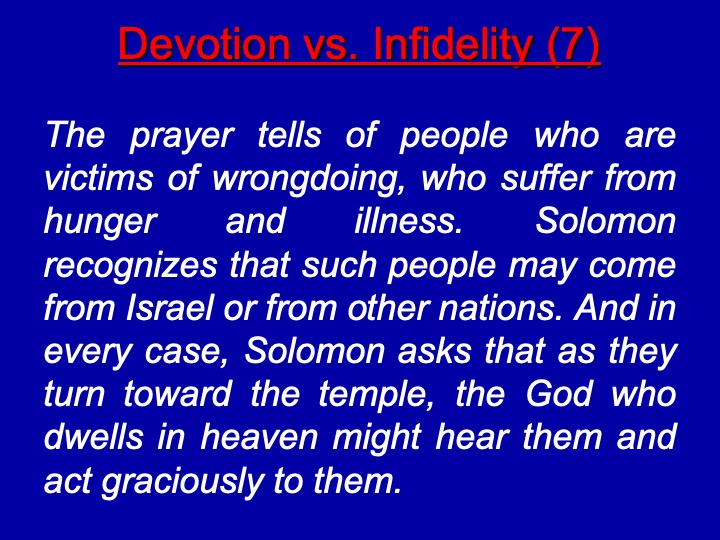
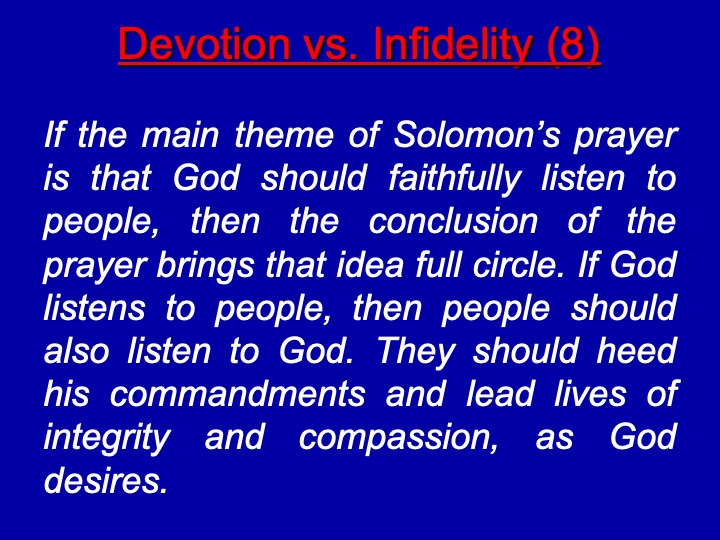
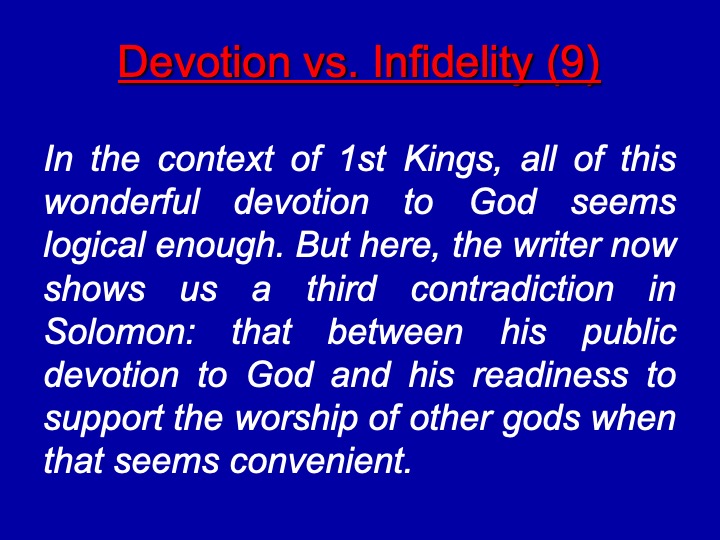
Solomon And Contradictions
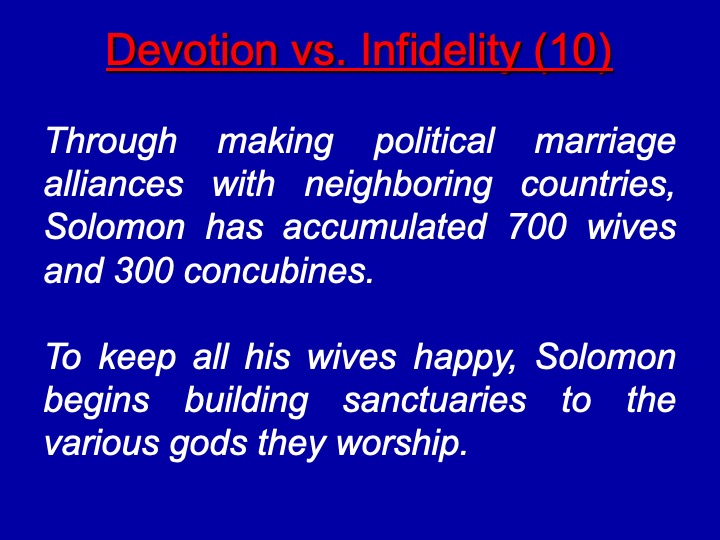
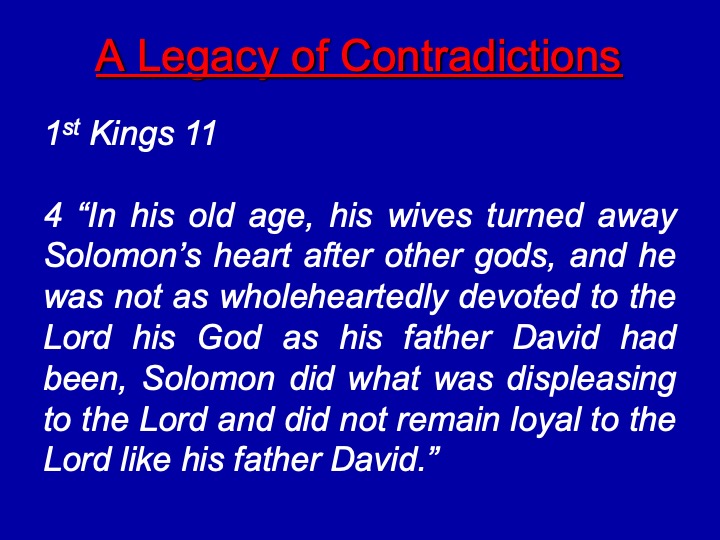
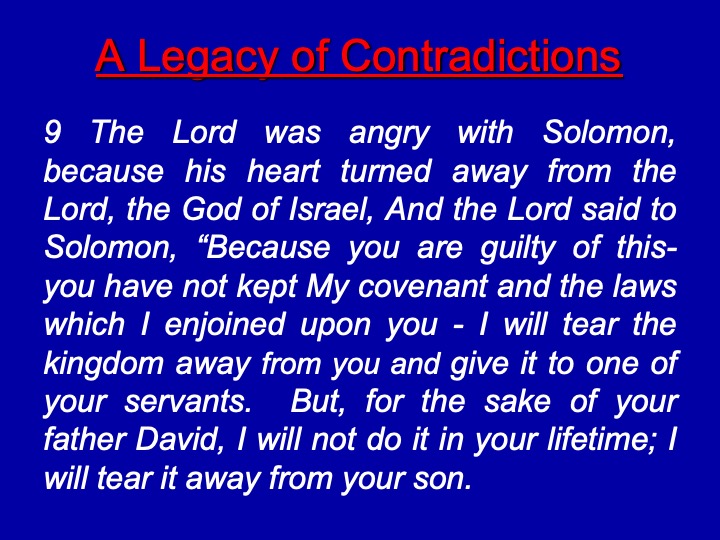
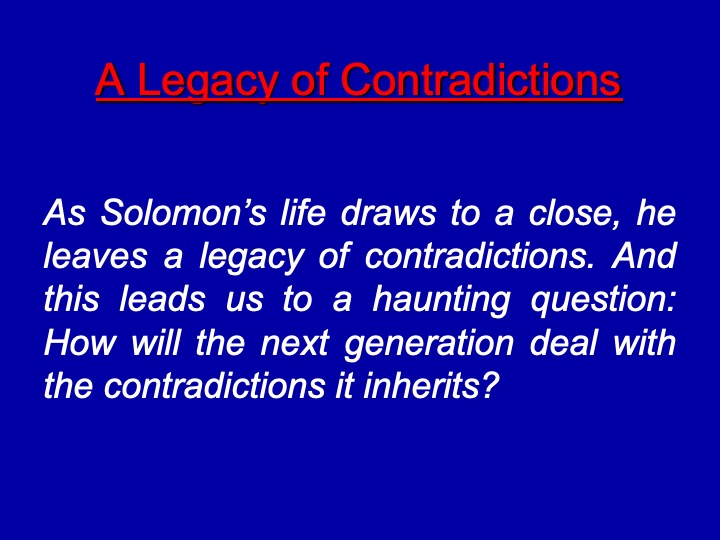
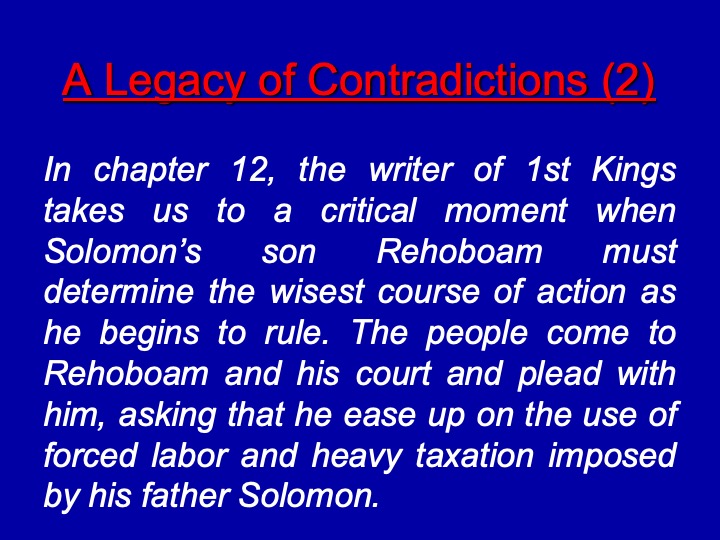
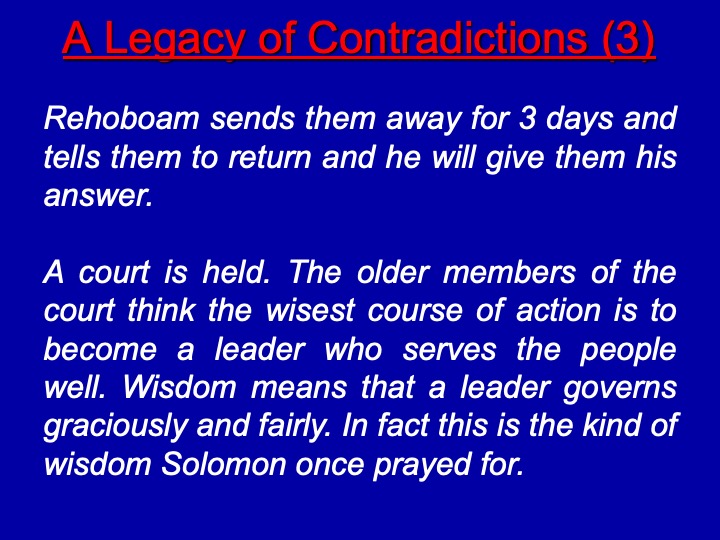
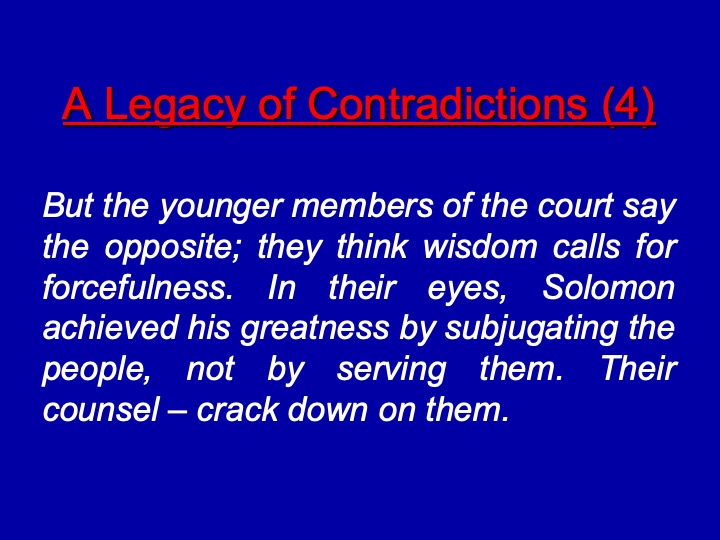
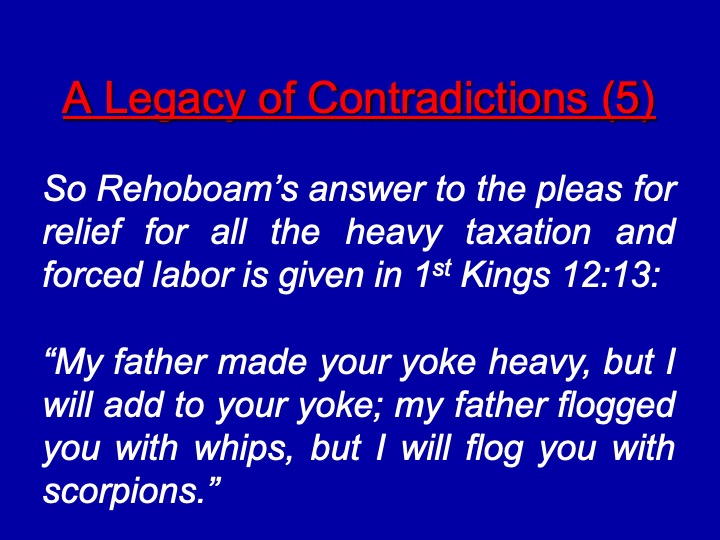
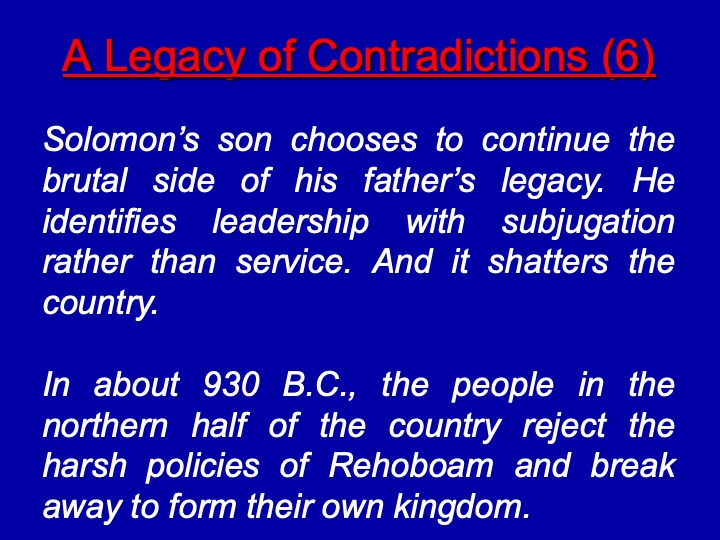
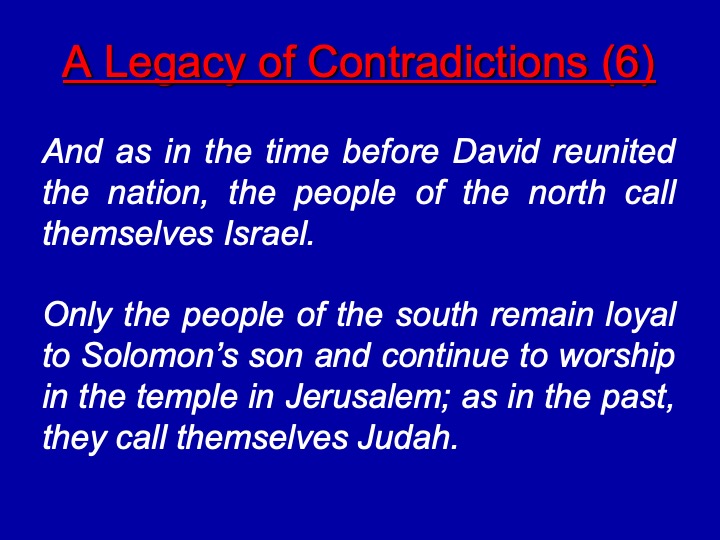
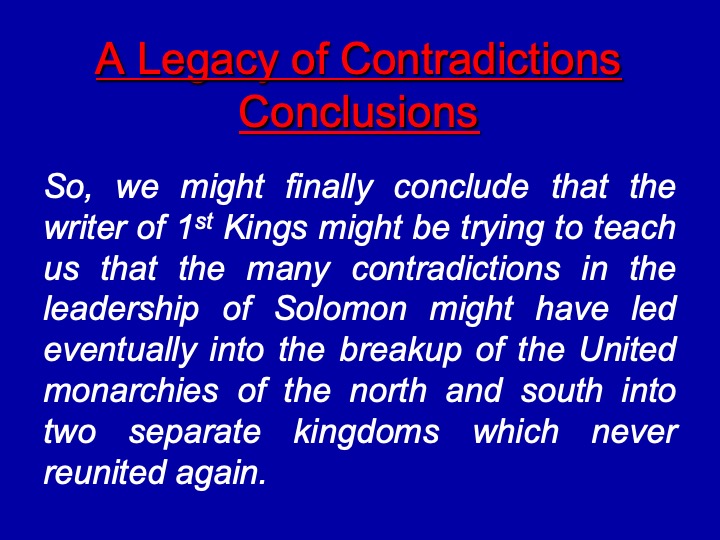
Solomon And Contradictions
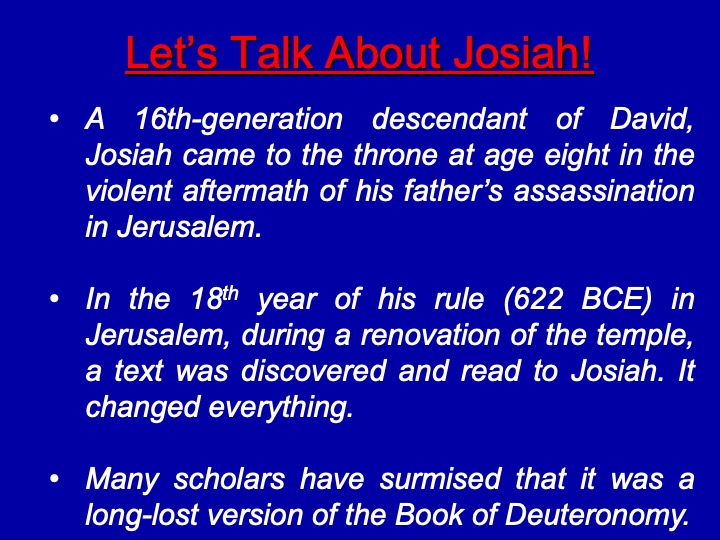
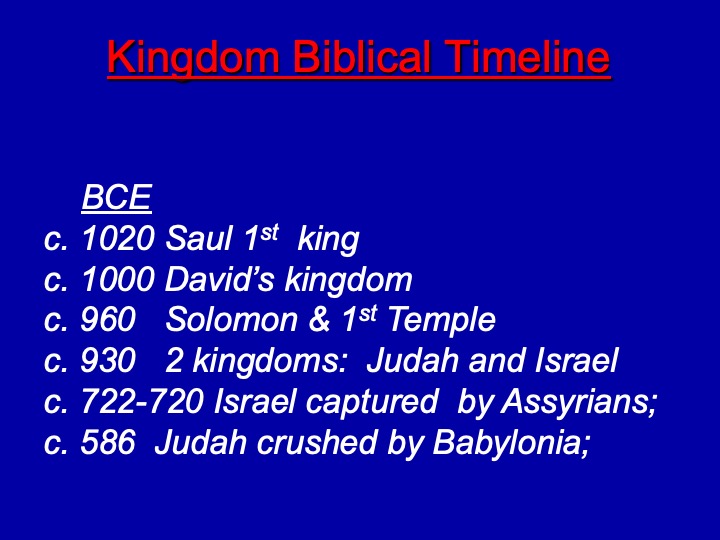
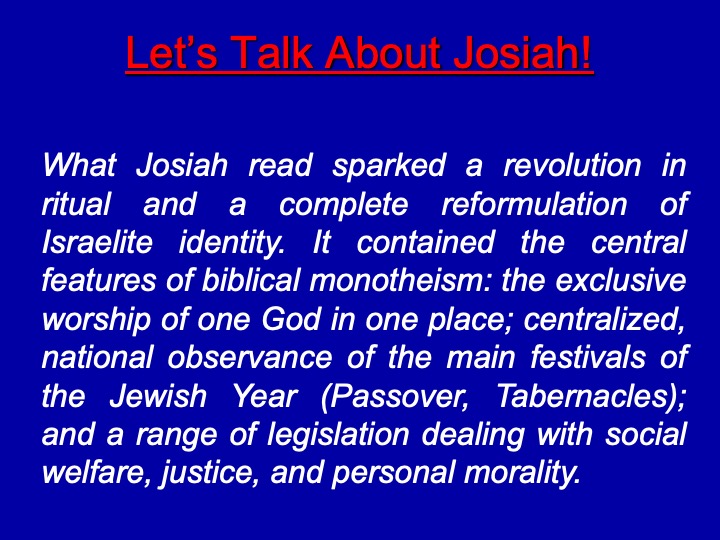

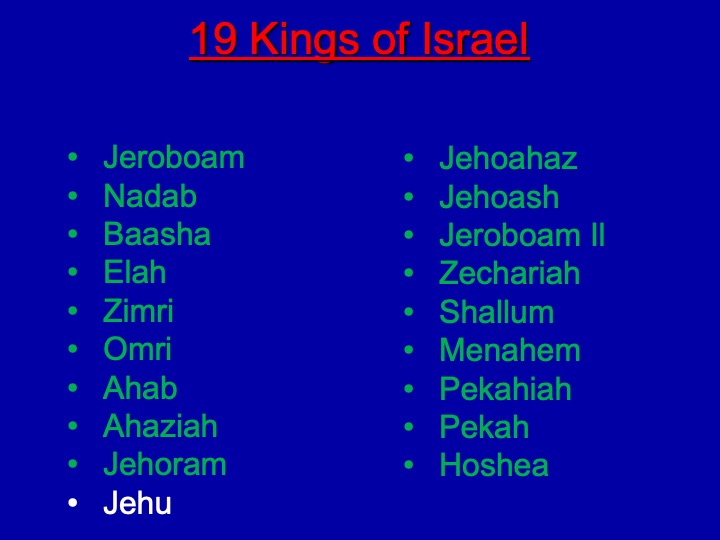
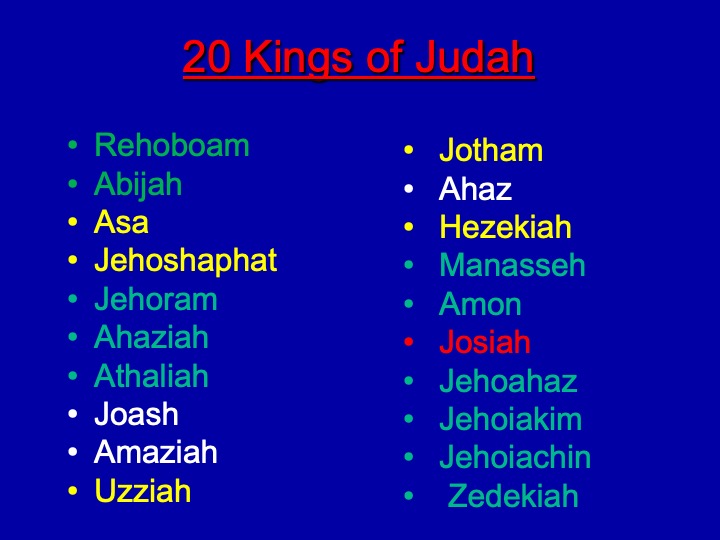
Solomon And Contradictions

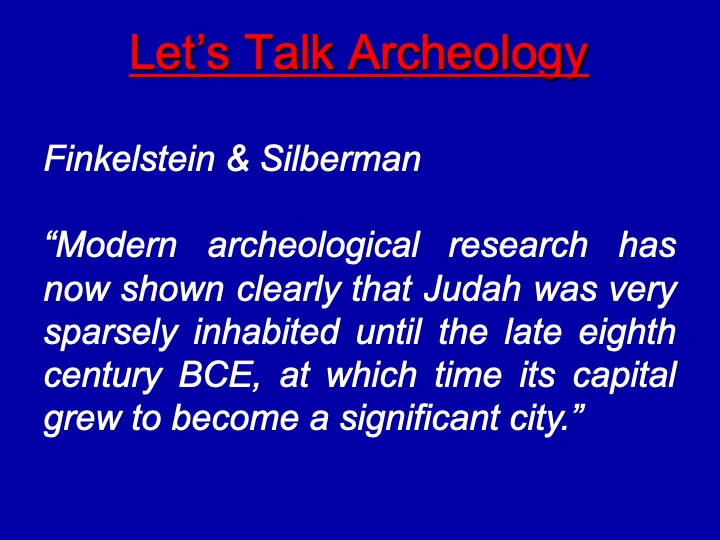
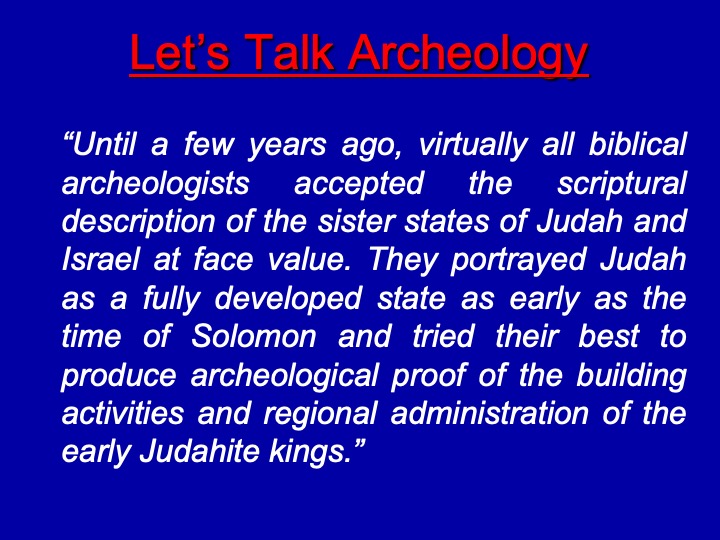
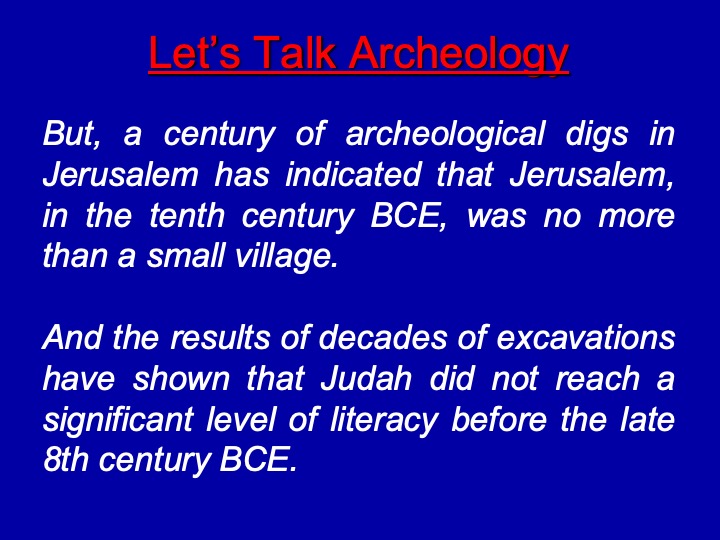
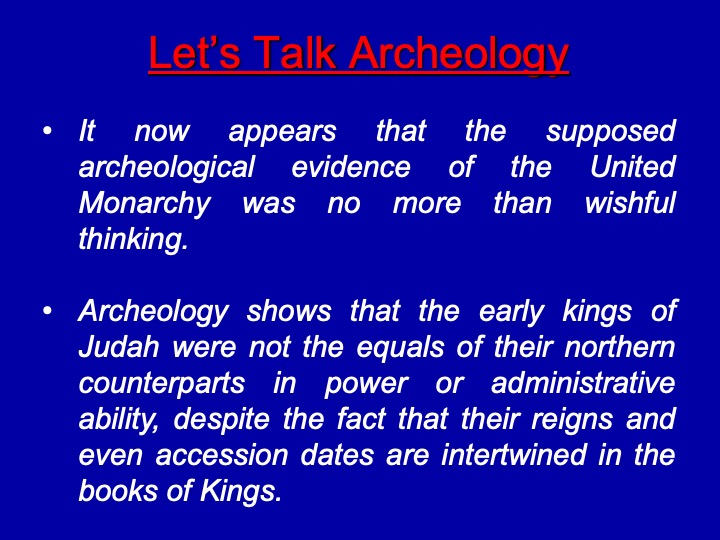
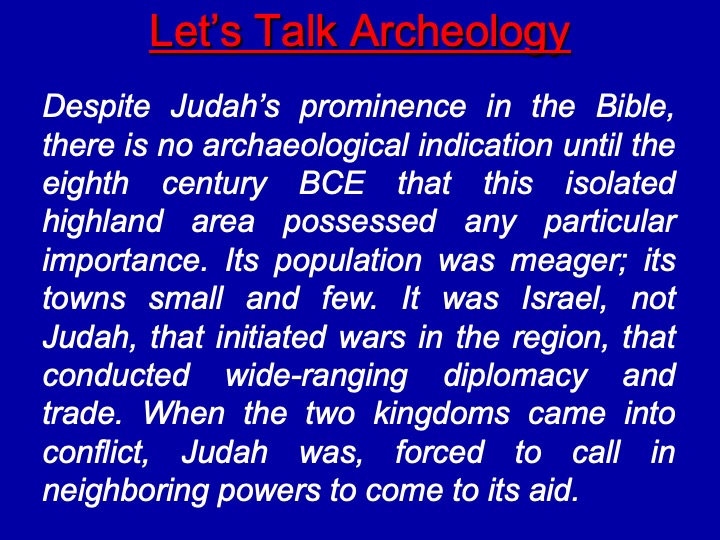
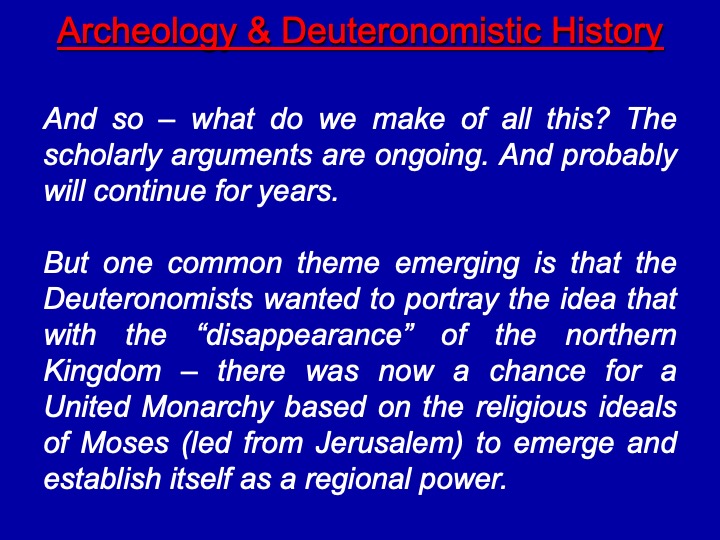
Solomon And Contradictions
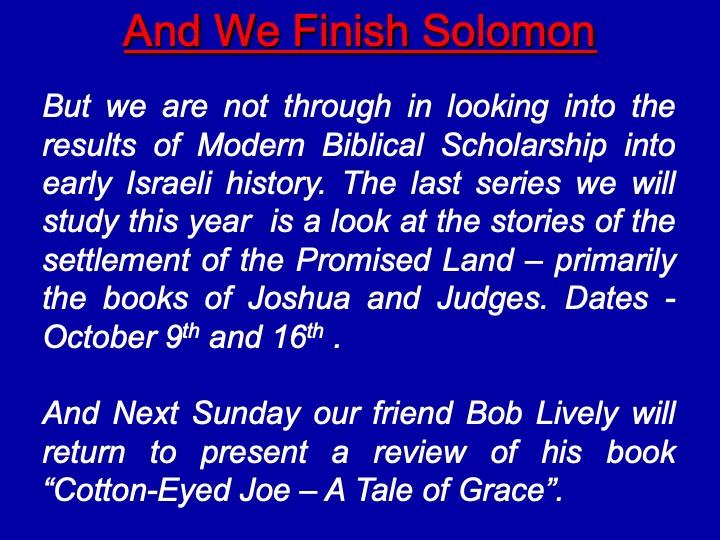
Solomon and Contradictions - Lesson 2
Links
< Home Page> < Solomon and Contradictions Menu > < Top of Page >
Solomon 2 – The Text
A Study in Contradictions
As a reminder the first contradictions we examined regarding Solomon’s Kingdom last week were:
Ambition vs. Wisdom
&
Splendor vs. Oppression
Devotion vs. Infidelity
The third aspect of the story is its religious dimension. In religious terms, Solomon’s reign involves both devotion and infidelity.
For much of the story, it is Solomon’s devotion to God that seems primary. After all, his most significant project was building the temple for God in Jerusalem - the temple that would be the central religious institution of Israel for centuries.
The writer gives us an extensive description of the temple, including the central building, the bronze basin in front of it, an altar for animal sacrifices, and the interior rooms.
The festival at which Solomon dedicated the new temple is described in 1st Kings 8. It is a scene filled with religious pageantry, in which the priests stage a procession to bring the Ark of the Covenant to the temple.
The splendor of Solomon’s court is celebrated in a famous scene in which the Queen of Sheba visits and says that the king’s court surpasses everything she has heard about it. The writer tells of Solomon offering countless sheep and oxen as sacrifices. Then, a cloud - signifying divine glory - fills the temple.
At this point, Solomon offers a prayer that defines the significance of the temple. We learn that the temple is where God is uniquely present. The prayer says that God’s dwelling place is actually in heaven, which means that God can’t be confined to any one place on earth. Instead, the temple is the place where God has made his “name” to dwell.
The emphasis on the name shows that God has a particular identity, and it’s an identity that is revealed through what he does for people. If someone asks which God is worshipped in the temple, the response is that it’s the God who delivered Israel out of slavery. It’s the God who made a covenant with them and shows steadfast love to them.
Those commitments give God his identity. Thus, when people come to the temple for worship, it’s a tangible way of turning toward the God whose identity has been made known in this way. Solomon’s prayer depicts the temple as a visible sign of God’s willingness to listen to people who need help.
The prayer tells of people who are victims of wrongdoing, who suffer from hunger and illness. Solomon recognizes that such people may come from Israel or from other nations. And in every case, Solomon asks that as they turn toward the temple, the God who dwells in heaven might hear them and act graciously to them.
If the main theme of Solomon’s prayer is that God should faithfully listen to people, then the conclusion of the prayer brings that idea full circle. If God listens to people, then people should also listen to God. They should heed his commandments and lead lives of integrity and compassion, as God desires.
In the context of 1st Kings, all of this wonderful devotion to God seems logical enough. But here, the writer now shows us a third contradiction in Solomon: that between his public devotion to God and his readiness to support the worship of other gods when that seems convenient.
Through making political marriage alliances with neighboring countries, Solomon has accumulated 700 wives and 300 concubines.
To keep all his wives happy, Solomon begins building sanctuaries to the various gods they worship.
A Legacy of Contradictions
1st Kings 11
4 “In his old age, his wives turned away Solomon’s heart after other gods, and he was not as wholeheartedly devoted to the Lord his God as his father David had been, Solomon did what was displeasing to the Lord and did not remain loyal to the Lord like his father David.”
9 The Lord was angry with Solomon, because his heart turned away from the Lord, the God of Israel, And the Lord said to Solomon, “Because you are guilty of this-you have not kept My covenant and the laws which I enjoined upon you - I will tear the kingdom away from you and give it to one of your servants. But, for the sake of your father David, I will not do it in your lifetime; I will tear it away from your son.
As Solomon’s life draws to a close, he leaves a legacy of contradictions. And this leads us to a haunting question: How will the next generation deal with the contradictions it inherits?
In chapter 12, the writer of 1st Kings takes us to a critical moment when Solomon’s son Rehoboam must determine the wisest course of action as he begins to rule. The people come to Rehoboam and his court and plead with him, asking that he ease up on the use of forced labor and heavy taxation imposed by his father Solomon.
Rehoboam sends them away for 3 days and tells them to return and he will give them his answer.
A court is held. The older members of the court think the wisest course of action is to become a leader who serves the people well. Wisdom means that a leader governs graciously and fairly. In fact this is the kind of wisdom Solomon once prayed for.
But the younger members of the court say the opposite; they think wisdom calls for forcefulness. In their eyes, Solomon achieved his greatness by subjugating the people, not by serving them. Their counsel – crack down on them.
So Rehoboam’s answer to the pleas for relief for all the heavy taxation and forced labor is given in 1st Kings 12:13:
“My father made your yoke heavy, but I will add to your yoke; my father flogged you with whips, but I will flog you with scorpions.”
Solomon’s son chooses to continue the brutal side of his father’s legacy. He identifies leadership with subjugation rather than service. And it shatters the country.
In about 930 B.C., the people in the northern half of the country reject the harsh policies of Rehoboam and break away to form their own kingdom.
And as in the time before David reunited the nation, the people of the north call themselves Israel.
Only the people of the south remain loyal to Solomon’s son and continue to worship in the temple in Jerusalem; as in the past, they call themselves Judah.
A Legacy of
Contradictions
Conclusions
So, we might finally conclude that the writer of 1st Kings might be trying to teach us that the many contradictions in the leadership of Solomon might have led eventually into the breakup of the United monarchies of the north and south into two separate kingdoms which never reunited again.
Let’s Talk About Josiah!
• A 16th-generation descendant of David, Josiah came to the throne at age eight in the violent aftermath of his father’s assassination in Jerusalem.
• In the 18th year of his rule (622 BCE) in Jerusalem, during a renovation of the temple, a text was discovered and read to Josiah. It changed everything.
• Many scholars have surmised that it was a long-lost version of the Book of Deuteronomy.
Kingdom Biblical Timeline
BCE
c. 1020 Saul 1st king
c. 1000 David’s kingdom
c. 960 Solomon & 1st Temple
c. 930 2 kingdoms: Judah and Israel
c. 722-720 Israel captured by Assyrians;
c. 586 Judah crushed by Babylonia;
What Josiah read sparked a revolution in ritual and a complete reformulation of Israelite identity. It contained the central features of biblical monotheism: the exclusive worship of one God in one place; centralized, national observance of the main festivals of the Jewish Year (Passover, Tabernacles); and a range of legislation dealing with social welfare, justice, and personal morality.
Our Bible, in 2nd Kings 23:25 praises Josiah as the greatest king ever:
“Neither before nor after Josiah was there a king like him who turned to the Lord as he did - with all his heart and with all his soul and with all his strength, in accordance with all the Law of Moses.”
19 Kings of Israel
• Jeroboam
• Nadab
• Baasha
• Elah
• Zimri
• Omri
• Ahab
• Ahaziah
• Jehoram
• Jehu
• Jehoahaz
• Jehoash
• Jeroboam Il
• Zechariah
• Shallum
• Menahem
• Pekahiah
• Pekah
• Hoshea
20 Kings of Judah
• Rehoboam
• Abijah
• Asa
• Jehoshaphat
• Jehoram
• Ahaziah
• Athaliah
• Joash
• Amaziah
• Uzziah
• Jotham
• Ahaz
• Hezekiah
• Manasseh
• Amon
• Josiah
• Jehoahaz
• Jehoiakim
• Jehoiachin
• Zedekiah
• The Bible Unearthed
• Finkelstein and Silberman
• 2002
Let’s Talk Archeology
Finkelstein & Silberman
“Modern archeological research has now shown clearly that Judah was very sparsely inhabited until the late eighth century BCE, at which time its capital grew to become a significant city.”
“Until a few years ago, virtually all biblical archeologists accepted the scriptural description of the sister states of Judah and Israel at face value. They portrayed Judah as a fully developed state as early as the time of Solomon and tried their best to produce archeological proof of the building activities and regional administration of the early Judahite kings.”
But, a century of archeological digs in Jerusalem has indicated that Jerusalem, in the tenth century BCE, was no more than a small village.
And the results of decades of excavations have shown that Judah did not reach a significant level of literacy before the late 8th century BCE.
It now appears that the supposed archeological evidence of the United Monarchy was no more than wishful thinking.
Archeology shows that the early kings of Judah were not the equals of their northern counterparts in power or administrative ability, despite the fact that their reigns and even accession dates are intertwined in the books of Kings.
Despite Judah’s prominence in the Bible, there is no archaeological indication until the eighth century BCE that this isolated highland area possessed any particular importance. Its population was meager; its towns small and few. It was Israel, not Judah, that initiated wars in the region, that conducted wide-ranging diplomacy and trade. When the two kingdoms came into conflict, Judah was, forced to call in neighboring powers to come to its aid.
Archeology & Deuteronomistic History
And so – what do we make of all this? The scholarly arguments are ongoing. And probably will continue for years.
But one common theme emerging is that the Deuteronomists wanted to portray the idea that with the “disappearance” of the northern Kingdom – there was now a chance for a United Monarchy based on the religious ideals of Moses (led from Jerusalem) to emerge and establish itself as a regional power.